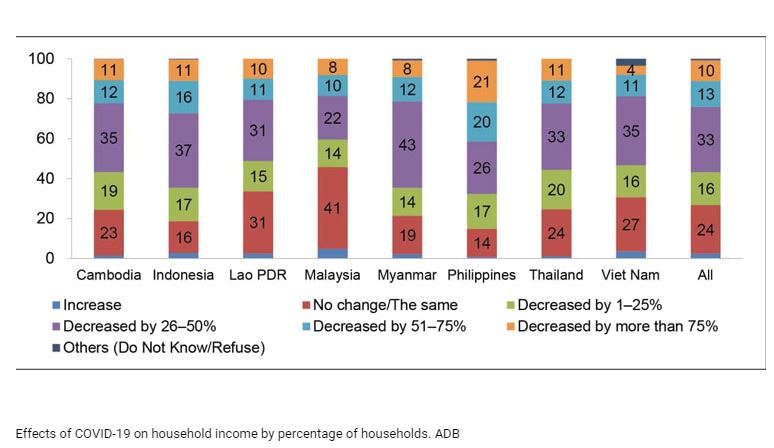Cambodia: Household spending power hit hard by COVID-19: Survey
A survey published by the Asian Development Bank (ADB) which gauged COVID-19’s effects on household cash revealed that 35 percent of Cambodian participants suffered a 26 to 50 percent decrease in their income, affecting their spending power.
The survey was conducted from May to July last year and used phone interviews to query residents of eight ASEAN countries about changes in income, employment and working hours since the end of 2019.
It found that “Nearly all households experiencing financial difficulties [throughout all ASEAN survey participants] had to reduce consumption, about half drew down cash and savings, while roughly a third did the following: borrowed from friends or relatives, delayed payments and debt repayment and applied for government aid.”
The eight countries surveyed were Cambodia, Indonesia, Laos, Malaysia, Myanmar, the Philippines, Thailand and Vietnam.
In total, the 1,026 Cambodians surveyed from both rural and urban areas revealed that 77 per cent of their household incomes had decreased.
Nineteen percent of those surveyed had a 1-25 percent decrease in income, 12 percent experienced a 51-75 percent reduction and 11 percent reported a drop of more than 75 percent.
Self-employed income and income earned from household businesses were affected the most throughout the eight countries, with 83 percent of respondents reporting a loss. Agriculture income and income earned from wages and salaries suffered less, with 60 percent of respondents reporting a loss in income from those sources.
Much lower decreases in income related to agriculture and fisheries were recorded in Cambodia than in the other seven counties. About 30 percent of households in Cambodia reported a loss in agricultural income, while the next smallest decline was in Laos, where about 50 percent reported a decline.
The survey also suggested that COVID-19 usually doesn’t discriminate and affects households equally regardless of income. However, this was not the case in Cambodia and the Philippines.
In Cambodia, lower-income households were less likely to be affected financially than higher-income households. In the Philippines, the opposite was true.
The report said: “This implies that income inequality may be widened after the pandemic in the Philippines and narrowed in Cambodia.”
It noted that lockdowns were a major factor in determining the severity of decreases in income, with the Philippines and Vietnam being particularly negatively affected by strict lockdowns.
The exception was Malaysia, where residents under lockdown received government assistance.
Out of the eight countries surveyed, Cambodia ranked the lowest in percentage of households suffering job losses or reduced workloads, at 25.2 percent. In comparison, 50.2 percent of Vietnamese households surveyed reported job losses or reduced workloads, while 73.5 percent of Filipino households reported the same.
When asked how long a household could survive if income stopped, 25.2 percent of Cambodians surveyed said they would be able to last for more than three months, while 32.5 percent said they could survive between one and three months. Outliers for this question were Indonesia, where 86.6 percent reported they could not last more than two week,s and Myanmar, where 49.5 percent reported they could last more than three months. As for coping with financial difficulties, 83 percent of all surveyed responded that they reduced consumption and expenditure to cope. The next most common strategies were using savings (50 percent) and borrowing from friends or relatives (38 percent).
Cutting costs on food was the most popular area to reduce expenses (about 80 percent), followed by non-essential daily expenditures (about 60 percent), utilities (about 60 percent) and dining out (about 60 percent).
Source: https://www.khmertimeskh.com/50829841/household-spending-power-hit-hard-by-covid-19-survey/


 English
English




